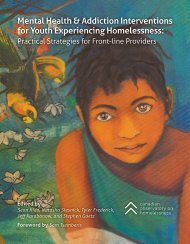Without A Home: The National Youth Homelessness Survey
Create successful ePaper yourself
Turn your PDF publications into a flip-book with our unique Google optimized e-Paper software.
29.5%<br />
identified as<br />
1.8%<br />
identified as<br />
2.5%<br />
identified as<br />
1.8%<br />
identified as<br />
LGBTQ2S<br />
transgender<br />
gender non-binary<br />
two-spirit<br />
While it is important that we<br />
provide services tailored to the<br />
gendered needs of young men<br />
and women who are homeless,<br />
it is absolutely imperative that<br />
we consider our responsibility<br />
to address the needs and safety<br />
of gender and sexual minorities.<br />
Homophobia and transphobia<br />
are key drivers of youth<br />
homelessness.<br />
We need to develop and implement solutions<br />
that attend to the needs of gender and<br />
sexual minority youth, but also ensure that<br />
the system as a whole does not replicate or<br />
amplify the homophobia and transphobia that<br />
young people experience leading up to their<br />
homelessness. Organizations working with<br />
young people must address these issues from<br />
a policy, practice, and training perspective.<br />
Failure to do so means that services and<br />
institutions become part of the problem. A<br />
good resource to support this work is the<br />
<strong>National</strong> Learning Community on <strong>Youth</strong><br />
<strong>Home</strong>lessness’ LGBTQ2S Toolkit.<br />
30.6%<br />
identified<br />
as Indigenous<br />
vs<br />
4.3%<br />
of the<br />
Canadian<br />
population is<br />
Indigenous<br />
10.1%<br />
28.2%<br />
identified as members of<br />
racialized communities<br />
vs<br />
19.1%<br />
of the Canadian<br />
population identifies as<br />
members of racialized<br />
communities<br />
were born outside<br />
of Canada<br />
Members of racialized communities are also<br />
overrepresented among homeless youth in<br />
Canada (28.2% compared to the Canadian<br />
average of 19.1%). Similarly, newcomer youth<br />
make up 10.1% of the sample. Consistent with<br />
other recent research (ESDC, 2016), Indigenous<br />
youth are extremely overrepresented, making<br />
up only 4.3% of the Canadian population but<br />
30.6% of the youth homeless population.<br />
More focused attention needs to be in place<br />
to support Indigenous youth and address<br />
the unique drivers of homelessness for this<br />
group. We cannot talk about addressing youth<br />
homelessness in Canada without addressing<br />
the needs of Indigenous youth.<br />
92<br />
WITHOUT A HOME: THE NATIONAL YOUTH HOMELESSNESS SURVEY

















